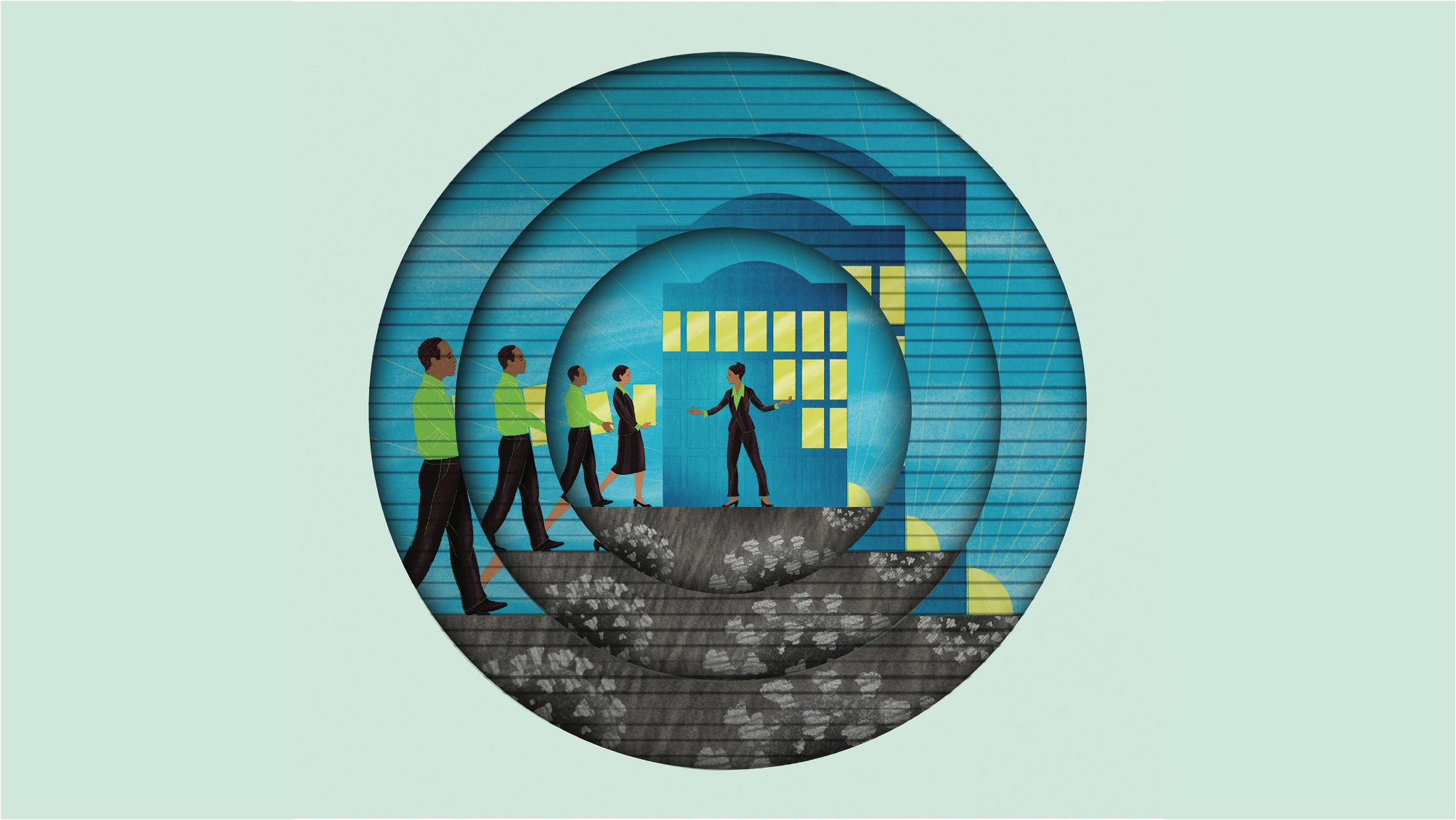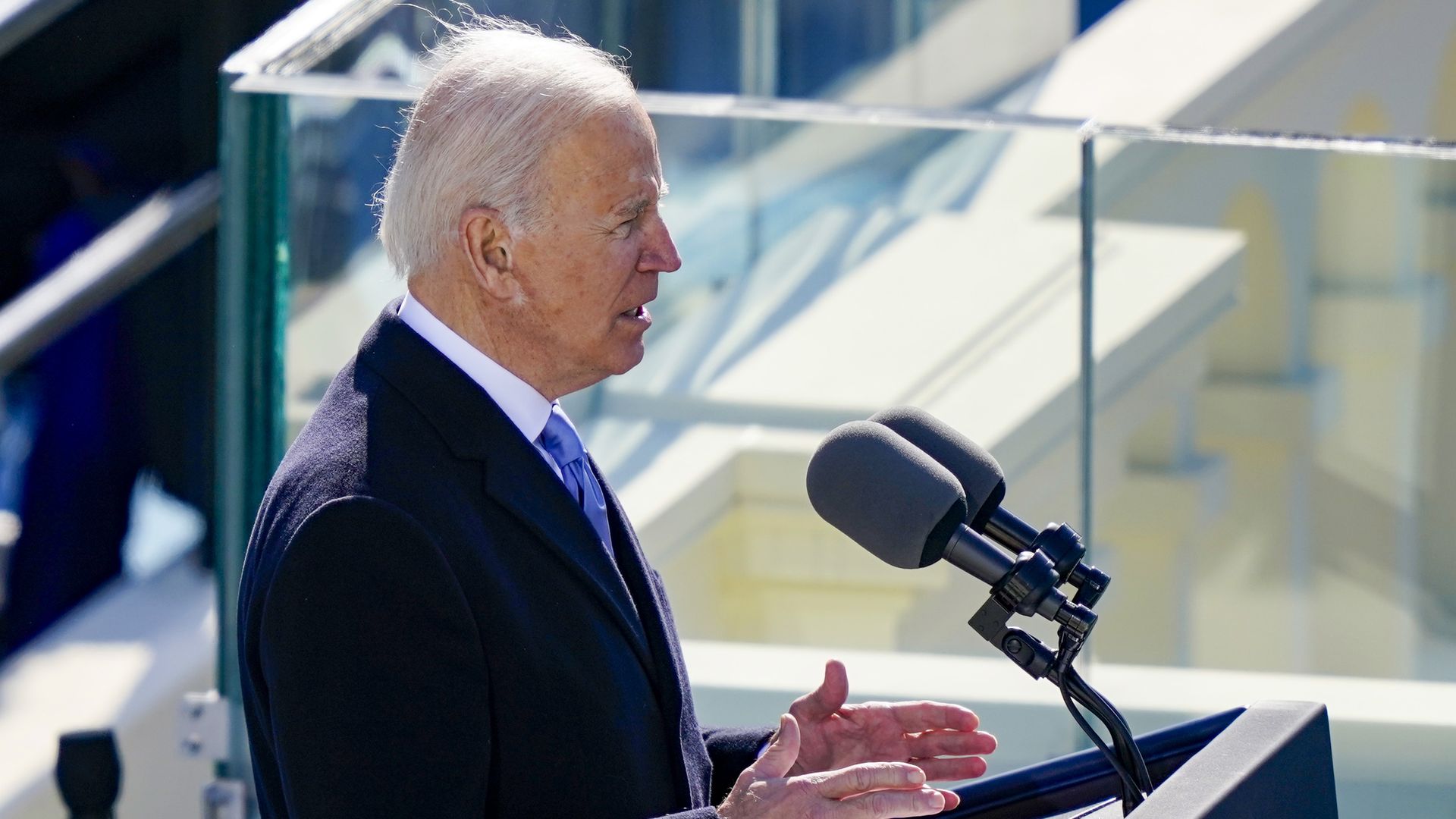| | | | | | | Presented By Deloitte | | | | Axios Future | | By Bryan Walsh ·Jan 20, 2021 | | Welcome to Axios Future, which was completed in between Amazon searches for "Bernie Sanders inauguration mittens." Today's Smart Brevity count: 1,839 words or about 7 minutes. | | | | | | 1 big thing: President Biden faces a deeply broken America |  | | | Illustration: Aïda Amer/Axios | | | | As President Biden begins his term in office today, he'll be tasked with leading a country beset with deep, long-term problems. Why it matters: Though the pandemic has made them worse, existential challenges around inequality, social alienation and political division in the U.S. were in place well before SARS-CoV-2 arrived on American shores. The country's future will depend in large part on whether the choices made over the next four years can flatten the curve of American decline. If the American Dream has a meaning, it's this: Children have a fair opportunity to surpass their parents economically. - But every generation since the Silents — Americans born between 1928 and 1945, which includes Biden — has seen social mobility dwindle, a trend that accelerated in recent years.
- For Americans from the middle percentile of income born in the 1980s, less than half were able to outearn their parents at the age of 30, thanks to sluggish wage growth, a sharp increase in the costs of necessary services like health and education, and the increasing concentration of income gains among the upper class.
- The U.S. labor market has fractured in half, with the college-educated largely thriving and those without a degree increasingly left behind, a trend intensified by the effects of automation and globalization.
The decline of social mobility and the rise of inequality — the U.S. has the highest level of income inequality among all G7 countries — are just two measures of a country that is deeply struggling. - More than 81,000 people died from drug overdoses between June 2019 and May 2020, the highest number of deaths in a 12-month period in the nation's history.
- Since 1999 the suicide rate has climbed 35%, and while the number of suicides in 2019 declined slightly, preliminary data from 2020 points to another increase.
- A majority of young American adults are now living with their parents, the first time the figure has reached that level since the Great Depression.
- Voters on both sides of the political divide don't just disagree on policy, but feel that those who supported the opposing candidate have little to no understanding of people like them.
What's happening: The pandemic — which has now taken the lives of more than 400,000 Americans, with more dying in the time it takes you to read this article — will worsen nearly every one of these trends. - Research from the Kansas City Fed found jobs that could be performed remotely — which includes most white-collar work — were largely untouched by the pandemic, which also saw the 10 richest people in the world increase their wealth by over $300 billion.
Yes, but: The American story is far from over, and in the midst of some of our darkest days, that story isn't all bad. - There's a reasonable case to be made that the corner has been turned on climate change, with the world likely to avoid the worst projected effects of global warming even before Biden took office with a mandate to act.
- If America is a less economically equal country than it was decades ago, it's a largely freer one for women, people of color and LGBTQ people, though significant progress still needs to be made.
The bottom line: "Few people in our nation's history have been more challenged or found a time more challenging or difficult than the time we're in now," Biden said in his inaugural address. - Biden was referring to the American people, but the words are just as true for the 46th president as well, as he takes up the task of binding up the nation's now decades-old wounds.
|     | | | | | | 2. Fighting COVID-19's effects on gender equality |  | | | Illustration: Eniola Odetunde/Axios | | | | Women around the world have borne a disproportionate brunt of the social and economic effects of COVID-19. Why it matters: Women in the U.S. and around the world already faced an unequal playing field before the pandemic. As countries prepare for the post-COVID-19 world, they need to take special care to ensure the virus doesn't permanently set back the cause of gender equality. What's happening: The Center for Global Development (CGD), a think tank that focuses on poverty and inequality, is launching the COVID-19 Gender and Development Initiative, which will seek to fill in data gaps about the gendered effects of the pandemic. By the numbers: The early indications are dire. - Data from 26,000 businesses collected across 50 countries shows women were more likely to close their businesses than men because of the pandemic and consequent social distancing policies.
- Female wage workers have been disproportionately forced into the informal sector or have been thrown out of work altogether.
- According to the Ludwig Institute for Shared Economic Prosperity's "true unemployment" metric, 30.9% of American women were unemployed as of November — an increase from October, even as the overall unemployment rate fell.
The disproportionate effects of containment measures on female-dominant sectors, the heavier role of women in child and elder care, and an uptick in domestic violence are all behind COVID-19's female recession, according to Megan O'Donnell, CGD's deputy director for gender. "COVID-19 is not just a short-term health crisis. The economic effects of this crisis are going to far outlast the direct health effects for women." — Megan O'Donnell The bottom line: "We need to recognize that addressing gender inequality is not just a side issue," says O'Donnell. "It is critical to an effective recovery from COVID-19." |     | | | | | | 3. Survey shows companies are open to moving to cheaper locales |  | | | The Phoenix office tower in Houston, Texas. The Lone Star State was the top stated destination for executives considering moving their operations. Photo: Loren Elliott/Getty Images | | | | A survey of C-suite executives found more than a quarter are considering moving their operations to another state or country. Why it matters: The forced march to remote work during the pandemic has shaken loose the bonds that tie large businesses to their home territory — and that could be bad news for high-cost cities and states. By the numbers: In a poll of 150 C-suite executives released on Tuesday and conducted by the consulting firm West Monroe, 29% of companies reported they were considering moving major operations or headquarters to another state or country. - The biggest reason was the cost of talent and living in their current location, followed by the burden of taxes.
- Not surprisingly, the No. 1 destination under consideration was Texas, followed by Florida — two states with generally low costs of living and low tax burdens.
Of note: West Monroe's chief strategy officer Tom Bolger tells Axios the West Coast "had by far more companies looking to relocate than any other geographical area in the survey." - That dovetails with recent reporting about tech companies and founders looking to relocate out of the Bay Area, which has some of the highest housing prices in the country.
- That includes Tesla and SpaceX CEO Elon Musk, who said in December that he was moving from California to Texas.
The catch: The small size of the survey means there's a limit to how much we can conclude from the results, and of course considering a move isn't the same thing as packing your bags, which I why I don't actually live in Miami. Be smart: Companies complaining about the high cost of living and working in states like California or New York is hardly new, but the embrace of remote work — accelerated by the pandemic — has given workers and CEOs more options. - Nearly half of the executives polled by West Monroe said they had plans to split their workforces between remote and onsite, though only 1% said they would go fully remote.
The bottom line: Mayors of high-cost cities may need to fight to keep their businesses. |     | | | | | | A message from Deloitte | | How trust is influencing the return to the workplace | | |  | | | | Business leaders have been rethinking and changing their office spaces, but workers are still skeptical of returning. - Less than 32% believe they are highly likely to return when offices reopen.
Explore four reentry strategies organizations should consider to create an environment of trust. | | | | | | 4. Tackling mental health via app |  | | | Illustration: Annelise Capossela/Axios | | | | A tech startup is helping providers monitor their patients' moods and mental health status through a remote app. Why it matters: Mental health is an unaddressed crisis in the U.S., and it's only gotten worse during COVID-19. NeuroFlow can help users track their own mental health while making it easier for health care professionals to identify when their patients are in crisis. Driving the news: The Philadelphia-based startup NeuroFlow closed on a $20 million Series B funding round last week for its remote mental health monitoring service. How it works: NeuroFlow uses technology — including a smartphone app — to keep health care providers in closer contact with their patients, allowing them to remotely monitor symptom progression and treatment. - NeuroFlow's CEO Chris Molaro notes that most mental health care in the U.S. is carried out by overburdened non-specialists who often lack the time and the expertise to keep track of their patients.
- The company's app can track the physical symptoms of behavioral health problems, like inactivity and sleep disruption, and feed that data back to primary care providers.
- "Users get feedback in the system, and clinicians are more informed about how care is going, so they can adjust as appropriate," says Molaro.
Details: NeuroFlow's partners include the U.S. Air Force, which in September agreed to expand the company's platform to multiple sites as part of an effort to monitor the combat readiness of airmen. - Molaro is a West Point graduate who served in the Army, and his experience with fellow veterans who struggled with mental health helped inspire him to co-found NeuroFlow.
- The COVID-19 pandemic has taken a toll as well. Early data from NeuroFlow showed a doubling of clicks on its "Find a Therapist" button in April 2020 compared to January of that year.
The bottom line: Tech will almost certainly never replace human beings when it comes to mental health care, but it "can help augment and enhance the way humans use their professional expertise," says Molaro. |     | | | | | | 5. Worthy of your time | | Worried about your firm's AI ethics? These startups are here to help (Karen Hao — MIT Tech Review) - "AI ethics as a service" is Silicon Valley's newest response to curtailing the negative effects of artificial intelligence.
Online speech and publishing (Benedict Evans) - Policing social media for misinformation will require a fundamentally different approach than those used for older media.
New coronavirus variants could cause more reinfections, require updated vaccines (Kai Kupferschmidt — Science) - The bad news about more contagious mutated strains of the novel coronavirus continues to grow.
Sharon Begley, path-breaking science journalist who spun words into gold, dies at 64 (Eric Boodman — STAT) - A remembrance of one of the greats of science journalism, who passed away on Saturday due to complications from cancer.
|     | | | | | | 6. 1 surprising thing: Maybe leaders aren't that important |  | | | President Biden gives the inaugural address on Jan. 20. Photo: Drew Angerer/Getty Images | | | | A new study questions the assumption that leaders in politics, business and sports are key to their organizations' success or failure. Why it matters: We put a lot of energy and money into picking our presidents, CEOs, and coaches, but their ability to influence events varies. What's happening: In a study published in Science Advances today, researchers used a novel statistical method to try to estimate the actual impact of individual leaders in a range of professions on actual outcomes. - They found that coaches in team sports like basketball and football had the biggest impact on point margins and wins and losses.
- Political leaders at the national level seemed to impact their country's economic performance, while governors affected fiscal policy and crime, and mayors had little impact on any of these areas.
- The CEOs of major companies did not seem to significantly affect the success or failure of their firms.
Of note: This last bit apparently hasn't had much effect on CEO compensation, which rose to an average of $21.3 million for the top executives at the largest 350 firms in the U.S. in 2019. The catch: The authors caution that their statistical method — randomized inference for leader effects, or RIFLE — is meant to determine whether leaders in specific professions matter, not gauge the quality of individual leaders. The bottom line: When it comes to leadership, it's often better to be lucky than good. |     | | | | | | A message from Deloitte | | The value of resilient leadership | | |  | | | | Challenges for leaders won't end with a COVID-19 vaccine. The reason: Trust has fractured across government, business and other pillars of society – and this will continue after the pandemic. How leaders can invest in, rebuild and renew the trust of stakeholders within their institutions. | | | | | | Axios thanks our partners for supporting our newsletters.
Sponsorship has no influence on editorial content. Axios, 3100 Clarendon Blvd, Suite 1300, Arlington VA 22201 | | | You received this email because you signed up for newsletters from Axios.
Change your preferences or unsubscribe here. | | | Was this email forwarded to you?
Sign up now to get Axios in your inbox. | | | | Follow Axios on social media:    | | | | | |








No comments:
Post a Comment